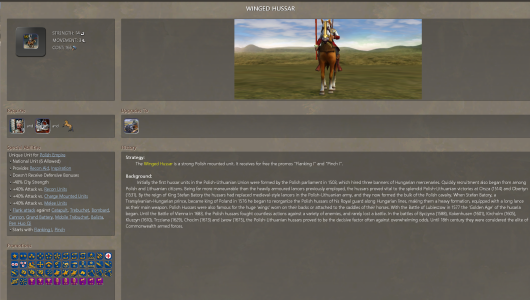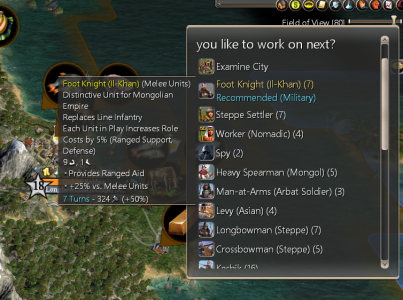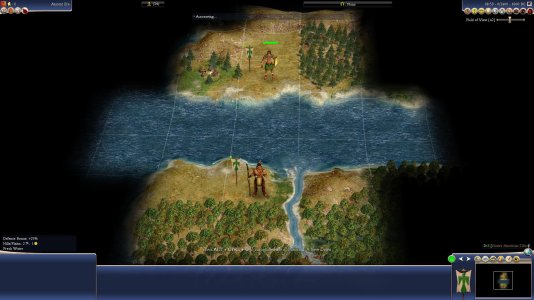^^ And you also have some distinctive units which are technically just distinctive but are almost good enough to be a proper UU, like the Polybian Legionary.

(Why that one isn't one of Rome's unique units already is a tad surprising to me, actually.)
You're right about me misunderstanding your suggestion. I took a few days to reply so I didn't reflexively just repeat my previous opinion.
It's an interesting idea. I'd quite like to see how it works in practise. I certainly wouldn't say WW makes 'all but the most brief and seamless wars impossible to wage without collapsing', though; I've had plenty of what I consider substantial, costly wars and not had an unmanageable problem on that front. It's only when I'm losing a war and I'm getting enemy culture in my cities and losing my garrisons that the WW-induced separatism gets out of my control. You may well go in for longer wars than I do, though.
I did some more thinking about it too (and hoping that Walter might have stopped by on the discussion as-is before it got more cluttered), and while I still think my suggestion would be a vast improvement (and presumably simple to implement), in that particular game, my cities which immediately revolted were actually those I had conquered from
someone else's secession. My own core cities were not at risk, but had that war continued for much longer, they likely would have been. The Nguni blobbed out of control early in the game like they typically do, and then in the late-medieval, they imploded into barbarian civ, which is diplomatically free to conquer, so I instantly swept-in and did it. I held and developed them nicely through the entire renaissance and early industrial era, so they had been well-invested in, but nevertheless these were the ones which all flipped again once I had invaded Denmark circa WW1-era.
Also, I play monarch; if I remember right you said that you play on noble. I think (but am not 100% sure) that there is already a mechanical WW difference between those levels, so if true, your relative lack of functionality problems with the revolutions would actually lend itself to my hypothesis.

Even if Walter doesn't like the idea, I would strongly like to find a way to edit this myself, if that's possible for a layperson without any particular coding skills. I am with ThirdOrbital that it already adds much more than it detracts as it is, but it just feels like this one thing would fix virtually all of the issues and disappointment people have been having with how it works in-game.
Another thought I've recently had on the whole "war weariness makes separatism scale out of control" question - I think the main trouble is that the tools we have to fight separatism are static / linear (-1 per spy point, -X per military unit, -10 from certain civics) whereas the detriments are all percent based (war weariness / domination / excessive militarism). I wonder if certain elements such as dictatorship and forced labor could be rebalanced to give scaling -% to separatism. Generally I find the "modern western government" build of democracy / representation / free market to be hugely strong in the late game, and I like the idea of war-mongering civs getting more dramatic bonuses from some of the less traditional government options.
Excellent point. I almost mentioned something about this, myself. Another important factor related to that which ought to be considered is that the scale of war increases throughout the game's timeline while the global separatism from war weariness lacks the buffer padding against this that war weariness's effect on happiness already has. (And I think that was more or less intentionally there to softly model disdain for war itself as a predominantly modern thing.)
So, for instance, the effect of WW on unhappiness globally is factored into a base of 200, which your population multiplied by active war weariness is divided into, which is why we rarely see it show up to any real degree of seriousness before the midgame. That works great for the unhappiness mechanic, but it's key to note that there's no analogue to the "padding" of 200 in the global modifier. It's just straight, active WW applied directly to all of your cities as separatism without a buffer on the amount added relative to population or anything else. I imagine that rewriting that system to factor something like this in would be unnecessary if simply changing the input values of the existing mechanic would effectively accomplish the same result.
WW Unhappiness in a City=
Pop x Active WW/200
As it is now, wars get bigger and bigger as the game's timeline progresses, and consequently involve more units getting destroyed, cities getting captured, teams involved, and all of these factors are untempered (by something like a base divisor of 200) as factors in global separatism scaling linearly: it's still +3WW for every unit you lose on foreign soil, +1 for every victory, etc., and when your stack has 50 units in the Napoleonic era instead of 8 in the classical, that makes an enormous difference with the functionality of the mechanic. I think all of this is what you were basically saying, though. Apologies for any redundancy.
I also agree that the "western liberal" government setup is very powerful and I like its existing drawback to WW, but yes, it does seem that CoP and Dictatorship should have more powerful counters to separatism for lacking the other benefits of the former. I was relatively disappointed when I deliberately switched to Dictatorship in anticipation of a war of conquest, and it played out in that regard exactly the way it would under Democracy. The extra happiness from additional garrisoned units didn't do anything to counter separatism, and was more or less comparable to Democracy with the constitutions and bonuses to mayor's houses, etc., anyway. If you're not going to get things like a massive culture bonus, happiness from every religion, big passive boosts to health and happiness, etc., you should be better poised to conquer extensively to compensate. In terms of flavor that would also feel a lot more satisfying as something meaningfully different as a government type.


 tax and is also uninteresting - you might as well just increase maintenance where separatism would be high.
tax and is also uninteresting - you might as well just increase maintenance where separatism would be high.


 (Why that one isn't one of Rome's unique units already is a tad surprising to me, actually.)
(Why that one isn't one of Rome's unique units already is a tad surprising to me, actually.)